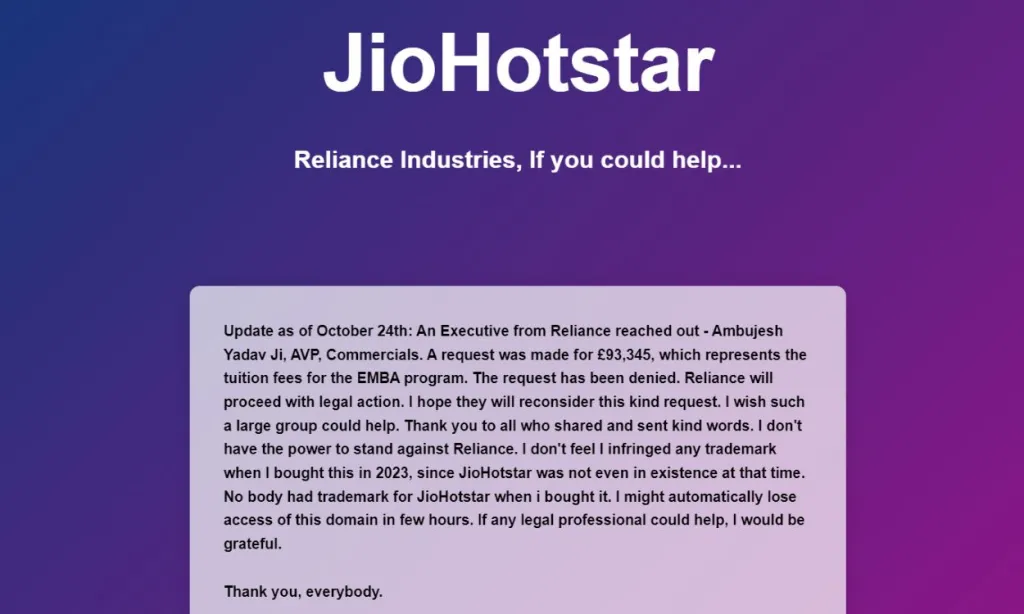Amid recent discussions surrounding a merger between Reliance Industries’ JioCinema and Disney’s Hotstar, a Delhi-based developer took the bold step of purchasing the domain “JioHotstar.com.”
The developer, who remains anonymous, has proposed an unusual deal: he’s offering to transfer ownership of the domain to Reliance in exchange for financial support to fund his studies at Cambridge University. Here’s a closer look at the developer’s proposal, his educational aspirations, and Reliance’s legal response to the situation.
The Developer’s Intent: Securing the Domain with a Purpose
As Reliance’s potential acquisition of Disney Hotstar in India drew attention, the developer recognized an opportunity and decided to act. Based on speculation that the merged entity could be rebranded as “JioHotstar,” he purchased the JioHotstar.com domain in the hopes of leveraging it as a bargaining tool.
His aim was to propose a deal that would benefit both parties, presenting Reliance with a timely domain name while securing funding for his educational goals.
Read : 39,000 4G Towers for BSNL Completed by TCS: Full Rollout by March 2025
The developer, who recently completed a stint with Cambridge University’s Accelerate program, has long aspired to pursue a full degree in entrepreneurship. In his publicized letter to Reliance executives, he explained his journey and desire to secure tuition funding for the Cambridge Executive MBA program.
The developer views this program as a gateway to advanced learning and professional growth, stating, “The program offers the knowledge and resources to build meaningful business solutions, and I have always dreamt of learning from the best.”
Read : Jio Platforms Gets Approval to Launch Satellite Internet in India
In his view, a small financial contribution from Reliance, amounting to ₹ 1 crore for his tuition, could unlock life-changing opportunities for him.
The Proposal to Reliance and Reliance’s Response
In his letter, the developer elaborated on his proposal, suggesting that Reliance could use the JioHotstar.com domain as a brand identifier for the merged streaming platform.
For Reliance, securing the domain could offer an ideal blend of Jio and Hotstar’s brand identities, appealing to their combined audience. He viewed his request for financial support as reasonable, considering Reliance’s scale and the domain’s potential branding value.

However, Reliance was quick to respond unfavorably to the proposal. In a statement shared by the developer, Reliance indicated that they would not entertain his funding request. Instead, the company plans to address the issue through legal avenues, pursuing what they describe as a case of “cybersquatting.”
This legal framework often applies when an individual acquires a domain name similar to an established brand, intending to sell it back to the trademark owner. Reliance’s legal team has reportedly started preparations to claim the JioHotstar domain, based on the argument that it infringes on their intellectual property.
The developer’s request has sparked a debate around entrepreneurial initiative and legal boundaries. While the developer claims his intention was not to profit from the situation but rather to create an opportunity to fund his studies, Reliance’s stance reflects the importance of protecting corporate trademarks in the digital age.
The case highlights how companies prioritize brand integrity, especially when domain names tied to recognized brands become available on the open market.
Navigating Legal Challenges: Cybersquatting and Intellectual Property Law
Reliance’s response to pursue legal action against the developer underlines a significant aspect of modern intellectual property law. In cases of cybersquatting, courts typically side with the trademark owner, especially when domain names closely resemble established brands.
The 1999 Anti-Cybersquatting Consumer Protection Act (ACPA) in the United States, for example, grants companies the right to take legal action against individuals who purchase domains resembling their trademarked names. This case would likely follow similar principles in India, where the legal framework for domain name disputes grants trademark holders strong protection.

The developer now faces the possibility of having to relinquish the domain without any compensation, as courts are likely to view Reliance’s claim as legitimate. In recent comments, the developer expressed disappointment, stating that he had hoped his proposal might open a constructive dialogue with Reliance, ultimately benefiting both parties.
He argues that his actions stemmed from a desire to realize his educational dreams, not from a profit-driven scheme. Despite this, the legal action highlights how corporate interests in brand protection can sometimes clash with individual entrepreneurial moves.
Reliance’s decision to pursue legal avenues reflects its commitment to safeguarding brand identity. For the developer, the path forward could be complex, involving court appearances and potential penalties.
However, he maintains that his initiative was driven by his ambition to secure a Cambridge education and that he remains hopeful for a positive outcome, even as the legal proceedings begin.

